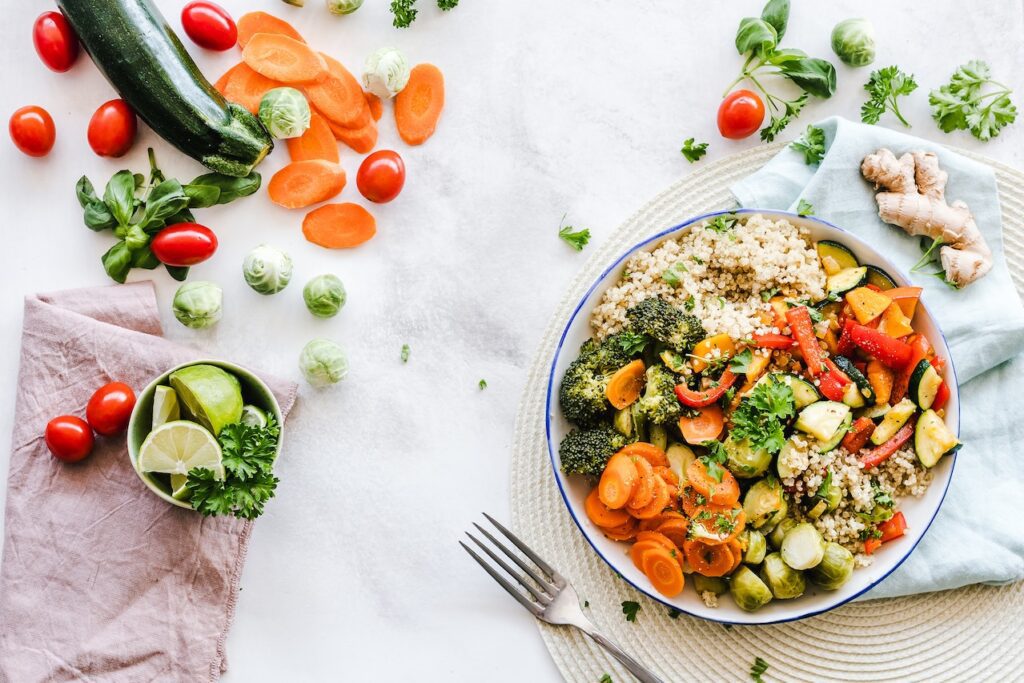Congratulations on your journey into motherhood and the decision to nourish your baby through the beautiful breastfeeding experience! As a breastfeeding mother, it is essential to prioritize your well-being and equip yourself with the knowledge and support necessary to make this journey successful and fulfilling. This comprehensive guide will explore the best foods to eat while breastfeeding, providing valuable insights and information to support your health and your baby’s growth.
Breastfeeding is a unique and intimate bond between a mother and her child. Not only does it provide essential nutrients for your baby’s growth and development, but it also offers numerous benefits for your health and well-being. Focusing on a nutritious and balanced diet can optimize your breastfeeding experience and ensure that you and your baby receive the nutrients necessary for optimal health.
In addition to discussing the best foods for breastfeeding, we will also cover important topics such as the foods to avoid while breastfeeding, healthy snack ideas for busy moms, and tips for maintaining a healthy breastfeeding diet. We will delve into the crucial nutrients during this phase, including proteins, healthy fats, calcium, iron, and omega-3 fatty acids. By incorporating these nutrients into your diet, you can provide your body with the fuel it needs to support lactation and ensure the well-being of both you and your little one.
Remember, every mother’s journey is unique, and it’s essential to listen to your body’s needs and consult with healthcare professionals as needed. Let this comprehensive guide be your companion as you navigate the wonderful world of breastfeeding and discover the best foods to support this incredible bond with your baby.
Nutritional Needs During Breastfeeding
Breastfeeding increases calorie needs, as your body requires extra energy to produce milk. On average, breastfeeding mothers need 300-500 calories daily. However, it’s important to note that individual calorie requirements may vary based on body weight, activity level, and metabolism.
In addition to calories, your body needs an adequate intake of macronutrients such as carbohydrates, proteins, and fats. These macronutrients are crucial in providing energy, supporting tissue repair, and aiding your baby’s development.
Micronutrients, including vitamins and minerals, are also essential for your and your baby’s health. These micronutrients are involved in various physiological processes and contribute to the overall well-being of both mother and child.
Best Foods for Breastfeeding Mothers
As a breastfeeding mother, focusing on consuming nutrient-dense foods that provide the necessary energy and nutrients for you and your baby is crucial. Here are some of the best foods to incorporate into your breastfeeding diet:
Oats and Whole Grains
Oats and whole grains are excellent sources of complex carbohydrates, which provide sustained energy for your body. They are also rich in fiber, which aids digestion and helps prevent constipation—a common concern for many new mothers. Start your day with a hearty bowl of oatmeal or enjoy whole grain bread, brown rice, and quinoa as part of your meals.
Lean Proteins
Including lean proteins in your diet is essential for repairing and building tissues. Opt for lean protein sources such as chicken, turkey, fish, eggs, tofu, and legumes. These foods provide amino acids for milk production and help you feel satiated for longer periods.
Colorful Fruits and Vegetables
Fill your plate with various colorful fruits and vegetables to ensure a wide range of vitamins, minerals, and antioxidants in your diet. Leafy greens like spinach and kale, vibrant berries, citrus fruits, sweet potatoes, carrots, and bell peppers are excellent choices. These foods provide essential vitamins, including vitamin C and A, which are vital for your health and your baby’s development.
Healthy Fats
Incorporating healthy fats into your diet is crucial for brain development and hormone production. Include foods such as avocados, nuts (almonds and walnuts), seeds (chia seeds and flaxseeds), and olive oil. These fats also contribute to the feeling of fullness and satiety.
Dairy Products
Dairy products are excellent calcium sources, essential for maintaining strong bones and teeth. Opt for low-fat milk, yogurt, and cheese to fulfill your calcium requirements. If you are lactose intolerant or prefer non-dairy alternatives, fortified plant-based milk and calcium-rich foods like tofu and leafy greens can be excellent alternatives.
Legumes and Pulses
Legumes and pulses such as lentils, chickpeas, black beans, and kidney beans are excellent plant-based proteins, fiber, and iron sources. They provide a sustained release of energy and help prevent iron-deficiency anemia—a common concern for many new mothers. Including these foods in your meals can support your overall energy levels and ensure proper iron stores.
Water and Hydration
Staying hydrated is crucial while breastfeeding. Drink adequate water throughout the day to support milk production and prevent dehydration. Aim for around 8 cups (64 ounces) of water daily, but listen to your body’s thirst cues and increase your intake as needed.
Remember, these foods serve as a general guide, and listening to your body’s needs and preferences is important. Maintaining a varied and balanced diet while breastfeeding will help ensure that you and your baby receive the necessary nutrients for optimal health and well-being.
Foods to Avoid While Breastfeeding
While it’s important to focus on consuming nutritious foods while breastfeeding, there are certain foods that you may want to avoid or consume in moderation. Here are some foods to be cautious about:
Caffeine
While a moderate amount of caffeine is generally safe for breastfeeding mothers, excessive consumption can affect your baby. Caffeine is a stimulant that can cause irritability and disrupt your baby’s sleep patterns. Limit your intake of caffeinated beverages like coffee, tea, and energy drinks. Pay attention to how caffeine affects your baby and adjust your consumption accordingly.
Alcohol
It’s recommended to avoid alcohol while breastfeeding, as it can pass into your breast milk and negatively affect your baby’s development. If you drink alcohol occasionally, it’s important to plan accordingly. Wait until the alcohol has cleared from your system before breastfeeding or consider expressing and discarding your milk during that time.
Strongly Flavored or Spicy Foods
Some babies may be sensitive to strongly flavored or spicy foods breastfeeding mothers consume. These foods can sometimes cause fussiness, gas, or digestive discomfort in your baby. Pay attention to your baby’s reactions and adjust your diet accordingly. You may avoid or limit the consumption of highly seasoned foods, spices, and spicy dishes if you notice any adverse effects on your baby.
Certain Fish with High Mercury Levels
While fish is generally a nutritious food choice, some types contain high levels of mercury, which can harm your baby’s developing nervous system. Avoid or limit the consumption of fish with high mercury levels, such as shark, swordfish, king mackerel, and tilefish. Instead, choose fish options lower in mercury, such as salmon, trout, sardines, and shrimp.
Allergenic Foods
If you have a family history of food allergies or suspect your baby may be prone to allergies, you might consider avoiding allergenic foods while breastfeeding. Common allergenic foods include cow’s milk, eggs, peanuts, tree nuts, soy, wheat, fish, and shellfish. If you notice any allergic reactions or sensitivities in your baby after consuming specific foods, consult a healthcare professional.
It’s important to remember that every baby is different, and what affects one baby may not have the same impact on another. Pay attention to your baby’s cues, behaviors, and unusual reactions to certain foods. If you suspect that a particular food is causing issues for your baby, consult a healthcare professional for guidance.
By being mindful of your diet and making informed choices, you can provide your baby a healthy and nourishing environment while breastfeeding.
Healthy Snack Ideas for Breastfeeding Mothers
As a breastfeeding mother, you may need additional fuel throughout the day to keep your energy levels up. Choosing healthy snacks can give you the nutrients you need while satisfying your hunger. Here are some nutritious and convenient snack ideas:
 Fresh Fruit
Fresh Fruit
Fresh fruits are a great choice for a refreshing and nutritious snack. They are packed with vitamins, minerals, and fiber. Opt for portable fruits like apples, bananas, oranges, and grapes that can be easily grabbed and enjoyed on the go. You can also prepare fruit salad or skewers for a more varied and visually appealing snack.
Greek Yogurt
Greek yogurt is a protein-rich snack that can help keep you full and satisfied. It’s also a good source of calcium. Choose plain Greek yogurt and add your own flavorings like fresh berries, sliced almonds, or a drizzle of honey for sweetness. Avoid flavored yogurts that may contain added sugars.
Nuts and Seeds
Nuts and seeds are nutrient-dense snacks that provide healthy fats, protein, and fiber. Almonds, walnuts, cashews, pumpkin seeds, and chia seeds are all excellent options. Create your own trail mix by combining a variety of nuts and seeds, or enjoy them on their own for a quick and satisfying snack.
Hummus and Veggies
Hummus is a flavorful and nutritious dip made from chickpeas. Pair it with a variety of fresh cut vegetables like carrot sticks, celery, bell peppers, or cucumber slices. This combination provides fiber, vitamins, and minerals, along with a satisfying crunch.
Whole Grain Crackers with Nut Butter
Choose whole-grain crackers that are high in fiber and pair them with your favorite nut butter, such as almond butter or peanut butter. This combination provides a balance of carbohydrates, healthy fats, and protein. Look for crackers with minimal additives and ingredients.
Hard-Boiled Eggs
Hard-boiled eggs are a portable and protein-rich snack option. They are easy to prepare in advance and can be stored in the refrigerator for quick and convenient snacking. Eggs also provide important nutrients like choline, which is beneficial for your baby’s brain development.
Vegetable Sticks with Guacamole
Slice up various colorful vegetables like carrot sticks, bell pepper strips, and cucumber rounds. Pair them with homemade or store-bought guacamole for a creamy and nutrient-rich snack. Avocados in guacamole provide healthy fats that can help keep you satiated.
Smoothies
Whip up a delicious and nutritious smoothie using your favorite fruits, leafy greens, yogurt, and a liquid of your choice (such as milk or a dairy-free alternative). Smoothies can be a great way to incorporate additional fruits and vegetables into your diet while providing hydration and essential nutrients.
Remember to listen to your body’s hunger cues and eat when you feel hungry. Snacking can be an opportunity to nourish your body and keep your energy levels up during this demanding time of breastfeeding. Choose snacks that are nutrient-dense, easy to prepare or grab on the go, and enjoyable to eat. Stay hydrated and make snacking a pleasurable part of your breastfeeding journey.
Tips for a Healthy Breastfeeding Diet
Maintaining a healthy diet while breastfeeding is essential for both you and your baby’s well-being. Here are some tips to help you establish a nourishing and balanced breastfeeding diet:
Eat a Variety of Nutrient-Dense Foods
Focus on consuming a wide range of nutrient-dense foods to ensure you receive a good balance of vitamins, minerals, and macronutrients. Add plenty of fruits, vegetables, whole grains, lean proteins, and healthy fats to your meals. This will help provide the necessary energy and nutrients for milk production and support your overall health.
Stay Hydrated
Proper hydration is crucial while breastfeeding. Drink adequate water throughout the day to maintain milk production and prevent dehydration. Keep a water bottle handy and drink whenever you feel thirsty. Aim for around 8 cups (64 ounces) of water daily, but adjust your intake based on your needs and activity level.
Include Healthy Fats
Including healthy fats in your diet is important for brain development and hormone production. Opt for sources of healthy fats such as avocados, nuts, seeds, olive oil, and fatty fish like salmon. These fats provide essential fatty acids that benefit both you and your baby.
Prioritize Protein-Rich Foods
Protein is crucial for repairing and building tissues and supporting milk production. Include lean sources of protein in your meals, such as chicken, turkey, fish, eggs, legumes, and tofu. Aim to have protein with each meal to support your body’s needs.
Consider Nutritional Supplements
While a well-balanced diet should provide most of the nutrients you need, some breastfeeding mothers may require additional supplements. Talk to your healthcare provider about whether you should take prenatal vitamins or specific supplements like vitamin D or omega-3 fatty acids.
Seek Expert Guidance and Support
Getting professional guidance and support regarding your breastfeeding diet can be immensely helpful. The Motherhood Center in Houston offers valuable resources to support breastfeeding mothers. They provide nutrition plans specifically designed for breastfeeding mothers, taking into consideration individual needs and dietary preferences. The center also offers breastfeeding classes led by experienced lactation consultants and educators who provide evidence-based information and guidance on nutrition during breastfeeding.
By availing yourself of the nutrition resources and attending breastfeeding classes at Motherhood Center, you can gain valuable insights into optimizing your breastfeeding diet and ensuring your and your baby’s well-being. Their comprehensive approach to breastfeeding education and support can help you confidently navigate the nutritional aspects of breastfeeding.
Remember, every mother’s breastfeeding journey is unique, and it’s important to listen to your body’s needs and consult with healthcare professionals for personalized guidance. With the right nutrition and support, you can provide your baby with the best start in life while maintaining your own health and vitality.
Breastfeeding Nutrition Resources at Motherhood Center in Houston
Motherhood Center in Houston provides comprehensive support and resources for breastfeeding mothers. They offer a range of services, including nutrition plans tailored specifically for breastfeeding mothers and informative breastfeeding classes. Here’s a closer look at the valuable breastfeeding nutrition resources available:
Nutrition Plans for Breastfeeding Mothers
At the Motherhood Center, expert nutritionists and dietitians work closely with breastfeeding mothers to develop personalized nutrition plans. These plans are designed to meet the unique nutritional needs of both mother and baby during breastfeeding. The nutritionists consider factors such as individual dietary preferences, any specific dietary requirements, and the overall health goals of the mother.
The nutrition plans focus on incorporating various nutrient-dense foods, ensuring an optimal balance of macronutrients and essential vitamins and minerals. They aim to support milk production, provide adequate energy, and enhance overall well-being. Following a tailored nutrition plan, breastfeeding mothers can ensure they nourish themselves and their babies with the right combination of nutrients.
Breastfeeding Classes
Motherhood Center offers informative and engaging breastfeeding classes facilitated by experienced lactation consultants and educators. These classes cover a wide range of topics related to breastfeeding, including the importance of nutrition for breastfeeding mothers.
During the classes, participants gain valuable insights into the specific dietary needs during breastfeeding. They learn about the key nutrients required for milk production, health, and foods to include and avoid. The classes also provide practical tips on meal planning, healthy snack options, and hydration strategies to support optimal breastfeeding nutrition.
The breastfeeding classes at Motherhood Center are designed to empower mothers with evidence-based information and guidance. They offer a supportive environment where participants can ask questions, share experiences, and connect with other breastfeeding mothers.
Expert Guidance and Support
At Motherhood Center, the nutritionists and lactation consultants provide expert guidance and support to breastfeeding mothers. They understand the unique challenges and concerns that can arise during breastfeeding. Whether addressing specific dietary needs, managing breastfeeding-related discomfort, or providing emotional support, the experts at Motherhood Center are there to assist.
By accessing the breastfeeding nutrition resources at Motherhood Center, breastfeeding mothers in Houston can benefit from the knowledge and expertise of professionals who specialize in supporting breastfeeding and nutrition. These resources aim to enhance the breastfeeding experience, promote optimal nutrition, and contribute to the overall well-being of both mother and baby.
To learn more about the breastfeeding nutrition resources, nutrition plans, and breastfeeding classes available at Motherhood Center in Houston, visit their website or contact them directly. Their dedicated team is ready to provide the support and guidance needed to navigate the nutritional aspects of breastfeeding confidently.
Conclusion
Ensuring a healthy and balanced diet while breastfeeding is crucial for your and your baby’s well-being. You can navigate this vital phase with confidence and support by following the tips for a healthy breastfeeding diet and accessing the valuable breastfeeding nutrition resources at Motherhood Center in Houston.
Remember to focus on consuming various nutrient-dense foods, staying hydrated, and incorporating healthy fats and protein into your meals. Listening to your body’s cues and seeking professional guidance, such as the personalized nutrition plans offered at Motherhood Center, can help optimize your breastfeeding nutrition.
Contact Motherhood Center today or sign up for a breastfeeding class to utilize the expert guidance and support available. Their dedicated team is ready to provide the assistance and knowledge you need to navigate the nutritional aspects of breastfeeding confidently. Don’t miss out on the opportunity to enhance your breastfeeding experience and ensure the best nutrition for your baby.
Remember, every breastfeeding journey is unique, and it’s essential to listen to your body, seek professional advice, and trust your instincts as a mother. With the right nutrition, knowledge, and support from Motherhood Center, you can create a nourishing and fulfilling breastfeeding experience for both you and your baby.
FAQs
Can I eat spicy foods while breastfeeding?
Yes, you can eat spicy foods while breastfeeding. Just monitor your baby for any sensitivity to certain spices.
Can I eat seafood while breastfeeding?
Yes, seafood can be a part of a healthy breastfeeding diet. Choose low-mercury options and limit consumption to 2-3 servings per week.
Should I avoid caffeine while breastfeeding?
Moderate caffeine intake is generally safe. Limit it to 2-3 cups of coffee per day or choose decaffeinated options.
Can I continue taking prenatal vitamins while breastfeeding?
Yes, taking prenatal vitamins is recommended for your health and the quality of your breast milk. Consult your healthcare provider.
How can I ensure I stay hydrated while breastfeeding?
Drink water when thirsty and aim for around 8 cups (64 ounces) daily. Include hydrating foods like fruits and vegetables in your diet.
Consult healthcare professionals or lactation consultants for personalized guidance regarding your breastfeeding diet.




 Fresh Fruit
Fresh Fruit


